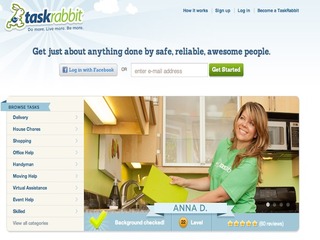Oxford Cancer Analytics raises $11M to detect lung cancer via a blood test
OXcan combines proteomics and artificial intelligence for early detection
Read more...
We are just a few weeks away from our inaugural two-day Splash Oakland event, taking place on May 6th and 7th. I will be moderating a panel discussing the future of marketplaces/the sharing economy with CEOs and investors betting on this segment.
The sharing economy refers to a group of companies, most of which have emerged over the last five years or so, that have upended traditional payment methods to, instead, rely on peer communities in which participants share access to both products or services.
The space includeds companies that, for example, allow people to share their cars (like Lyft), share their apartments (like Airbnb), share their clothes (like Rent the Runway), even their children's toys (Pley). It also includes companies that allow people to simply connect to each other through platforms to offer their services directly (like Care.com).
The whole idea all about getting what you need when you need it, and not having to own it forever.
Market size
This is a broad category to be sure; it can involve many, many different verticals and subsections. Some even lump companies like eBay and Craiglist in, since they also eliminate the middle man and allow people to sell things to each other directly.
Overall, the market that is estimated to have been worth $110 billion in 2013. The peer-to-peer rental market alone was said to be worth $26 billion. Obviously there is a lot of money to be made.
So, not surprisingly, venture capitalists have taken notice and, as a result, numerous companies in the space having racked up huge amounts of cash. They include:
Last July, Jerimiah Owyang of Altimeter Group looked at 200 companies in the sharing economy and found that they had a collective $2 billion influx of funding. The average funding per company was $29 million.
Meet the panel!
On May the 6th, I will be joined by four distinguished people with a background in the sharing economy space. They are:
Some of the topics we will discuss include:
1) Some companies in this space, including Airbnb, but especially those in the car-sharing business, have faced some very difficult legal hassles around the country. Why is that and what is the end result going to be?
2) Considering that just about anything, within reason, can be shared, how big can this space ultimately become?
3) With services like UrbanSitter and Care.com, the emphasis seems to be on cutting out the middle man and allowing people to just deal with each other directly. Why do you think this idea is appealing to people? Does it reinforce a sense of community that we maybe have started to lose?
4) Some analysts seem to lament the sharing economy, seeing it as a sign that people no longer have the money, or the stability, to buy things. Will the rise of the sharing economy start to come down if, and when, the economy starts to improve, or is it here to stay?
5) New York implimented something like the sharing economy with its CitiBike program last year. Is this something that has started to happen in other parts of the country, or other parts of the world?
We hope to see you at the event next month!
(Click here for tickets to Splash. Want to demo your services and products? Get a demo table here.)
(Image source: flutteringthroughfirstgrade.com)
OXcan combines proteomics and artificial intelligence for early detection
Read more...Nearly $265B in claims are denied every year because of the way they're coded
Read more...Most expect to see revenue rise, while also embracing technologies like generative AI
Read more...Angel group/VC
Joined Vator on
Founded in 1995, August Capital is a leading venture capital firm actively investing in entrepreneurial teams throughout the information technology market spectrum.Startup/Business
Joined Vator on
Airbnb.com is the “Ebay of space.” The online marketplace allows anyone from private residents to commercial properties to rent out their extra space. The reputation-based site allows for user reviews, verification, and online transactions, for which Airbnb takes a commission. As of June, 2009, the San Francisco-based company has listings in over 1062 cities in 76 countries.
Startup/Business
Joined Vator on
Founded in 2006, Care.com is the largest and fastest growing service used by families to find high-quality caregivers, providing a trusted place to easily connect, share caregiving experiences and get advice. The company addresses the unique lifecycle of care needs that each family goes through-child care, special needs care, tutoring and lessons, senior care, pet care, housekeeping and more. The service helps families find and select the best care available based on detailed profiles, background checks and references for hundreds of thousands of mom-reviewed and pre-screened providers who seek to share their services. Through its Care.com Employer Program, corporations can offer Care.com memberships as a benefit to employees. www.care.com
Startup/Business
Joined Vator on
TaskRabbit is launched in Boston, San Francisco Bay Area, Los Angeles, Orange County, and is expanding quickly to other major cities
Startup/Business
Joined Vator on
Lending Club is a social lending network where members can borrow and lend money among themselves at better rates.
Lending Club provides a much improved infrastructure for social lending: state-of-the-art technology to authenticate all users (ensuring making sure they are who they say they are); credit scoring systems which rate borrower risk; and, the automated clearing house (ACH) system to move the funds between both parties. In addition, we provide our LendingMatch™ system to minimize risk and allow community based lending.
Startup/Business
Joined Vator on
RelayRides is the world's first peer-to-peer carsharing service. Our revolutionary service provides the technology, infrastructure and marketplace for car owners to securely and conveniently rent out their vehicles when they are not using them personally. This provides people seeking convenient transportation with a new option, and makes it easier for urban dwellers to enjoy mobility without owning a car.
As the average US car is driven only 66 minutes a day, RelayRides represents the first opportunity for car owners to monetize this underused asset. By providing the infrastructure, technology and marketplace for car owners to rent out their vehicles, RelayRides gives current car owners the means to monetize a largely underused asset. By enrolling in RelayRides, owners turn a car from an expense into a cash machine, with average profit of approximately $3,550 annually (net of depreciation costs).
How RelayRides Works:
Car owners list their vehicle on the RelayRides website, designate availability, rental price, and who may rent the vehicle (via Facebook and other social networks). Car renters browse available vehicles on RelayRides.com, reserve a car by the hour or day, and swipe an issued card over a card reader sensor on the vehicle for access during rental.
To streamline the rental experience, gas and insurance are included.
Startup/Business
Joined Vator on
An online service for parents and sitters to connect through people they know, UrbanSitter makes booking a trusted babysitter as easy as booking dinner reservations. The site enables parents to search, book and review trusted sitters within minutes.
Headquartered in San Francisco, UrbanSitter was founded by a group of Internet veterans who wanted to use technology to power a faster, more personal babysitting service. For more information or to sign up, visit www.urbansitter.com.

Joined Vator on

Joined Vator on
Third time entrepreneur. Co-founder of UrbanSitter. Previous start up experience at Xuny.com and BridgetPath.com. Finance/development experience at Joie de Vivre Hosp, LaSalle Partners and Gap Inc.
Joined Vator on





